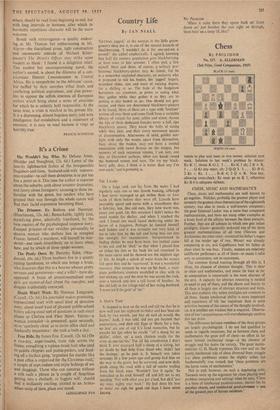Chess
By PHILIDOR No. 117. A. ELLERMAN (2nd Prize, Good Companions, 1915) BI.ACK (I I men)
WHITE (10 men)
wiirrE to play and mate in two moves: solution next week. Solution to last week's problem by Ahues: Kt-K I !, threat R-Q 2. 1 ... Kt-K 5 eh; 2 B x R.
1 Q Kt any other, eh; 2 Q-Q 3. 1 . . . Kt-B 6; 2 Kt x Kt. 1 . . . R-K 4; 2 Q x R. Nice key, allowing cross-check; Kt must go to K 1, otherwise Kt-B 6 is adequate defence.
CHESS, MUSIC AND MATHEMATICS
Chess, music and mathematics are well known to go together. Philidor, probably the greatest player and certainly the greatest chess theoretician of the eighteenth century, was also in music a well-known composer; the great Emanuel Lasker was a more than competent mathematician, and there are many other examples at a lower level of the affinity between the three pursuits. Further, they are all subjects in which one gets infant prodigies; Gauss—generally reckoned one of the three greatest mathematicians of all time (Newton and Archimedes the other two)—corrected his father's wages bill at the tender age of two, Mozart was already composing at six, and Capablanca beat his father at chess when he was four. Finally, women are relatively indifferent performers at all of them—in music I refer only to composers, not to executants.
The common thread running through all this is, I think, the element of abstract thought. This is clear in chess and mathematics, and music (at least as far as composition is concerned) is the most abstract of the arts. A capacity for abstract reasoning is needed to excel in any of them, and the charm and beauty in all three is largely one of abstract structure and form. This also explains why infant prodigies are common in all three. Innate intellectual ability is more important and experience of life less important than in most activities because of the nature of the thought involved, i.e. it is intellect not wisdom that is required. Observa- tion of one's acquaintances will overwhelmingly confirm this last point.
The differences between members of the three groups are largely psychological. I do not feel qualified to speak as regards musicians, but as between chess and mathematics the great pull of chess—to offset its far more limited intellectual range—is the element of struggle and the desire for victory. The great mathe- matician G. H. Hardy expresses this view and on the purely intellectual side of chess divorced from struggle (i.e. chess problems) makes the slightly unfair but fundamentally true remark that 'chess problems are the hymn tunes of mathematics.'
Not to end, however, on such a depfessing note, Tarrasch sums up the argument for chess playing (and problem composing and solving) when he says, 'Chess is a form of intellectual productiveness; therein lies its peculiar charm, and intellectual productiveness is one of the greatest joys of human existence.'






























 Previous page
Previous page